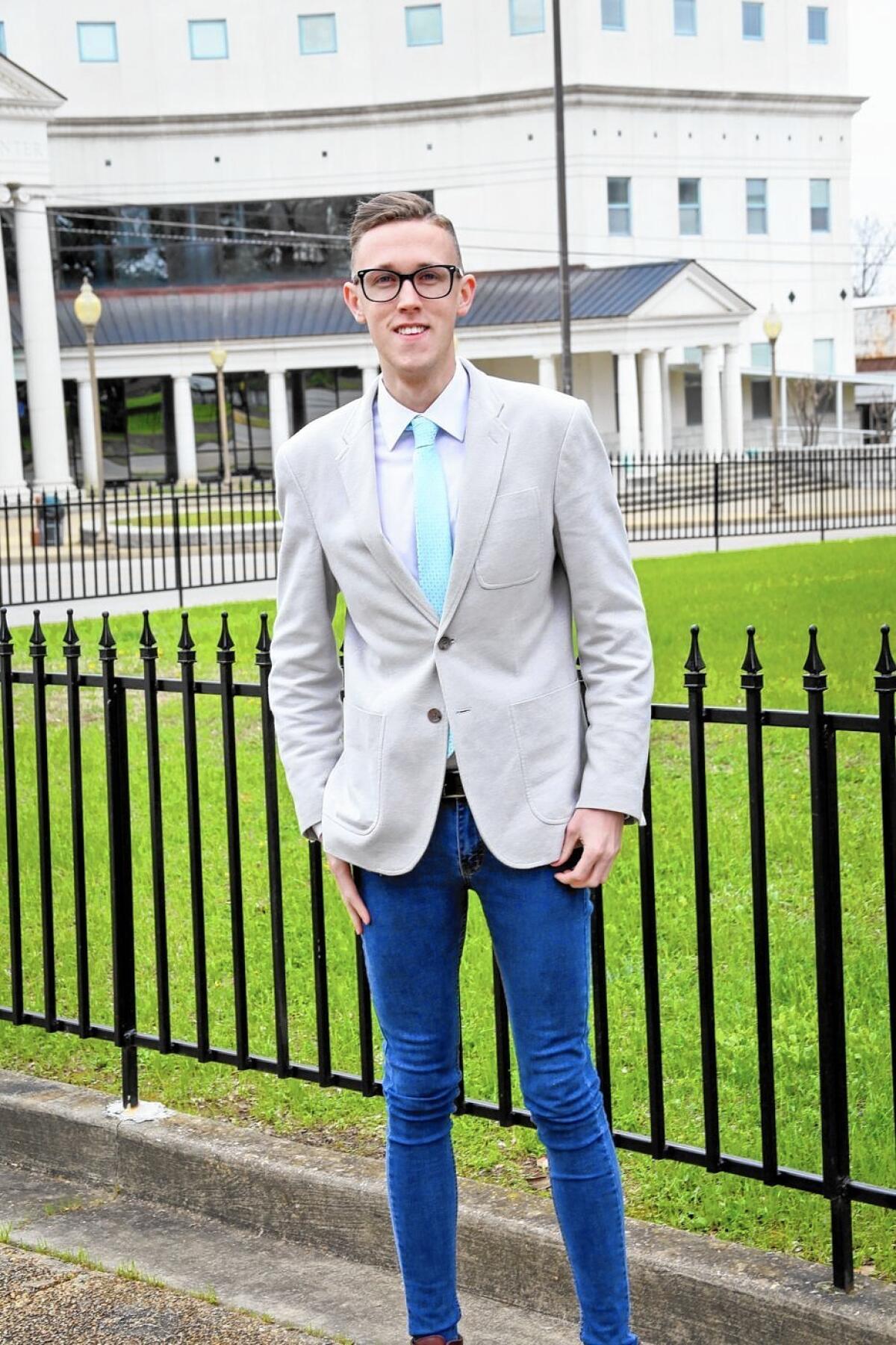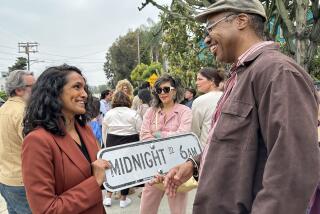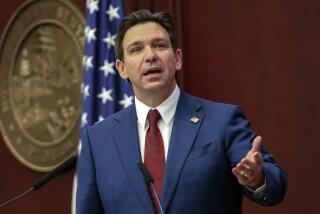Gay rights supporters prepare for fight in Mississippi beyond marriage

Reporting from TUPELO, Miss. — At Hardee’s restaurant on the east side of town, near the tiny two-room house where Elvis Presley was born, five mostly retired Tupelo good old boys sit nursing coffee, talking about gay marriage.
“I’m agin it,” said Roger Morgan, 78, as the others nodded in assent. “‘Cause my Bible says marriage is between a man and a woman. It didn’t say anything about Adam and Steve.”
Such attitudes are common in this bastion of Southern Baptists, but they’re increasingly under fire — not only by a national wave of court rulings, but by gay rights activists mobilizing in the conservative American heartland like never before.
From its newly opened advocacy office in Tupelo, the national LGBT organization Human Rights Campaign is leading an effort to persuade Main Street business owners here to post “We Don’t Discriminate” stickers in shop windows. Organizers are lobbying the City Council to endorse a nondiscrimination pledge.
And a new generation of homegrown activists like Will Knight, a 22-year-old community college English teacher, see it as their mission to increase gay visibility. “I feel sometimes I come out every day,” Knight says.
The national debate over gay marriage and equality is sweeping through this deeply religious town like a spring tornado, uprooting long-held biases but also stirring a conservative backlash.
Fire-and-brimstone preachers, such as the Rev. Forrest Sheffield of Harrisburg Baptist Church, complain that gay activists and judges who support same-sex marriage “have got Mississippi by the jugular.” From the headquarters of the American Family Assn., which runs a conservative national radio network, host Bryan Fischer tells listeners that homosexuality should be criminalized like drug use.
As gay rights groups fight for a legal beachhead at the Tupelo City Council, conservatives last year persuaded the Mississippi Legislature — which is defending its ban against same-sex marriage — to adopt a law to make it easier for religious-minded individuals, businesses and others to openly discriminate against gays and lesbians without fear of being sued.
Like it or not, gay marriage is likely coming to Tupelo, either at the hands of a New Orleans federal appeals court that could soon announce a ruling, or when the U.S. Supreme Court takes action in June. A majority of the justices is widely expected to legalize gay marriage nationwide.
But lingering hostility toward homosexuality here explains why many gay families predict their problems won’t end with a legal victory for same-sex marriage.
“Marriage equality is around the corner for Mississippi and the entire nation,” said Amelie Hahn, a 37-year-old lesbian raising two children. “This is great. But that piece of paper isn’t going to ensure that we keep our jobs, or that kids can come out in schools. It’s scary here.”
Hahn’s story reflects not only the difficulties of growing up gay in the South, but the high stakes same-sex couples have in the marriage debate.
Despite its conservatism, Mississippi has the highest rate of same-sex couples raising children among the 50 states, according to a 2013 study by UCLA’s Williams Institute on Sexual Orientation and Gender Identity Law and Public Policy.
Twenty-six percent of gay couples in Mississippi are raising children, higher than the rates in more progressive communities like Los Angeles or New York (16% and 17%, respectively), the study found. Experts speculate that the rate is higher in conservative states in the South, West and Midwest in part because gays and lesbians often face pressure to enter heterosexual relationships and start families before coming to terms with their sexuality.
Growing up with a devout Christian father, Hahn buckled to social pressure and married a man when she was in her 20s. They had two children. “It’s what I have always been brought up to believe you do,” the New Orleans native said, even though she knew she was a lesbian.
Years later she came out, got divorced and moved with her children to Tupelo, hoping for a fresh start. But Hahn quickly found that living openly as a lesbian with kids, including a disabled daughter, was difficult.
“I’ve had people spit at my car,” she said. “They whisper as I walk by in a restaurant. In the grocery store, two elderly ladies said, ‘Oh my God, that’s the homosexual woman with a kid in a wheelchair.’” Tired of the animosity, Hahn decided to move to the state capital, Jackson, where “it’s a lot easier to breathe.”
Hahn’s experience is why gay rights groups say they are already gearing up for the next battle: passing a federal law to ban discrimination in employment, housing and commerce based on sexual orientation and gender identity. Census figures suggest there are more than 60 same-sex couples in Tupelo raising children, but most keep a low profile or remain in the closet.
Groups like the Human Rights Campaign are taking that battle to the states and to the streets, opening offices recently in Alabama and Mississippi, the two most disapproving of same-sex marriage.
Tupelo, named for the Tupelo gum trees that inhabited the surrounding swamps, grew up around a railroad crossing just before the Civil War, when it was burned to the ground by Union troops. It has always been known as a progressive city economically but is conservative socially and politically. Tupelo voted against Barack Obama by nearly 2 to 1, well above the statewide average. It is a place where residents don’t hesitate to ask a stranger, “You follow Christ?”
“Tupelo is one of the strongest church-based communities I’ve ever seen in my life,” said Sheffield, the Baptist minister, whose 3,500-member congregation expelled its Boy Scout troop after the national association decided to accept gay members. Two-thirds of the residents of Tupelo and the surrounding county are affiliated with a church, and 60% of those are Southern Baptists.
At the same time, Tupelo is known in Mississippi as having a small liberal counterculture. It has its own professional symphony orchestra (the smallest city in the country to have one), two ballet companies and several art galleries. Two years ago it elected Democrat Jason Shelton, who gay activists say is a privately sympathetic mayor.
Although gay groups are pushing the City Council for a pledge not to discriminate, their chances appear slim.
Volunteers like Bob Spencer, lay leader of the local Unitarian Universalist Church, have been walking downtown, home to the hardware store that sold Elvis his first guitar, asking business owners to post window stickers stating, “We Don’t Discriminate. If you’re buying, we’re selling.” Few businesses have complied, and one that did lost business as a result.
“It was important to me to be one of the businesses that stood up and said, ‘I’m tired of Mississippi being known as one state that discriminates,’” said Moe Briston, a Tupelo native who runs the local Culligan water treatment company.
After Briston posted the sticker, she lost a major account of 15 years, the American Family Assn., worth $1,200 a year. But the stickers are still there.
There are some anecdotal signs of progress. When a prominent Presbyterian minister recently urged his congregation to “stand up for the Bible” against homosexuality, more progressive churchgoers bristled at the intolerance and he was almost fired, according to members. He took a leave of absence to reflect, one member said.
Knight, the openly gay English teacher, said his goal is to ensure that people know there are gays in the community. A survey by the Human Rights Campaign last year showed that only half of Mississippi’s residents say they know someone who is gay, compared with 9 in 10 Americans nationwide.
“Something about the South, a lot of people say they have never been introduced to someone who is gay,” he said.
Knight says he is sometimes frustrated that more gays are not active in gay rights here.
“I think there is a lot of fear here and, as much as fear, shame,” he said. “That goes a long way to caging a lot of people.”
Like Hahn, he believes that legal marriage is just a first step. “I don’t feel like Mississippi should stop at marriage. There are so many other areas where we are not equal,” he said.
Rob Hill, a former United Methodist pastor who heads the Human Rights Campaign’s Mississippi office, recalled a Tupelo elected official once telling him that “gays are fully accepted here, but we just don’t talk about it.”
“How open and accepting is it if you live and get by in that community, but yet you can’t be open about who you are?” Hill asked. He agreed it would require more than legalized gay marriage to pry open the Southern closet.
“Marriage equality will come to Mississippi,” Hill said. “But the problem with that is that you can get married on Saturday but lose your job or get kicked out of your apartment on Monday.”
More to Read
Sign up for Essential California
The most important California stories and recommendations in your inbox every morning.
You may occasionally receive promotional content from the Los Angeles Times.











